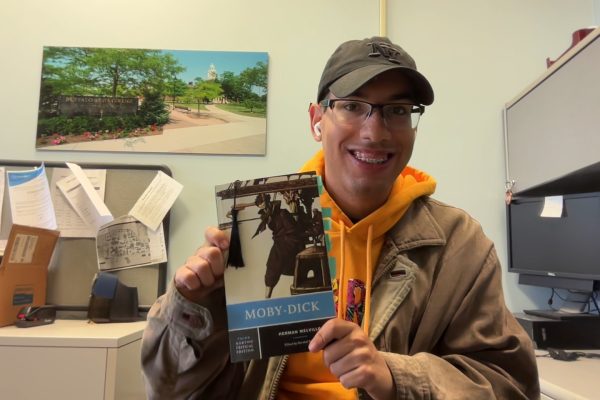Numerous factors turn average citizens into criminals
April 13, 2016
All over the world at any given minute, a person is committing a crime. In 2008, the crimes of the century involved finance, white-collar crimes. Now we are back into an era of blue-collar crimes – aside from the biggest crime of all – the presidential race.
People take such an interest in learning about law and order, but sometimes people don’t always know what is in the criminal’s mind. Then I got to thinking: what makes someone want to commit a criminal act?
Is it psychological, is it based on a person’s neighborhood, or is it something that you just can’t explain? If people are so interested in watching a show called “Criminal Minds,” can’t they learn about it? I couldn’t help but wonder.
What makes a criminal?
For starters, there is a matter of external influence and internal influence; how people process the world around them can also be a factor in what happens.
To start, a major influence on people is their parents. People learn life choices, and where they belong in society from their family; specifically, their parents or guardian.
Parents or guardians are a major part of the development of any child and behaviors that are considered acceptable to society. If kids learn at an early age that certain criminal activity is okay, then they see no harm being done in the process.
Friends are also a piece of the criminal puzzle, and people experience this through two simple words… peer pressure. If your friends can pressure you into something, who is to say that they won’t pressure you into something else? That’s why people have to learn to say no when it comes to fishy circumstances; remember you know what’s best for you.
Now, this next factor may seem weird, but it makes sense. Love is always a reason to commit crimes. Sure, this is farfetched, but it can happen as shown through cheesy romance novels, goofy romantic comedies, and the Jim Carrey film, “I Love You, Phillip Morris.”
The film is based on the life of con man and escape artist Steven Jay Russell, who committed insurance fraud, credit card fraud, practiced law without a license, embezzled money, and escaped from prison multiple times. On April 5, 1998, Steven Russell was arrested trying to secure Phillip’s release, and was given an unprecedented life sentence. Russell remains in 23-hour-a-day lockdown, with only one hour per day for supervised showers and exercise.
Russell never committed his crimes because he wanted to or needed money, but he did it out of love for Phillip, and a previous boyfriend, Jimmy. In order to provide a better life for the men he loved, he conned, scammed, lied, and stole to get them the life he thought they should have. That’s the trouble, it wasn’t the life they wanted, but the life Steven wanted; impersonators are tricky to find because in the blink of an eye, they are someone else.
From 1964 to 1967 a young man impersonated a Pan-American Airways Airline Pilot, and flew over two million miles for free. He was also the chief resident pediatrician at a Georgia hospital, impersonated an Assistant Attorney General in Louisiana, and cashed $4 million in fraudulent checks all before he was 19 years old! This is the life of Frank William Abagnale, and guess what he does for a living now… he helps the FBI in catching people that are passing bad checks.
Frank William Abagnale is a famous imposter whose only reason for committing the crimes he did was because he could. Other cons he did stemmed from the fact that he was trying to run from the guy who eventually captured him, Carl Hanratty. Money is the root of all evil, and in this case, it was the root of the reason that Abagnale committed the crimes.
When no other motive presents itself, the problem is usually money. White-collar criminals, such as Jordan Belfort, many of the bankers involved in the collapse of the global economy in 2008, and someone like Bernie Madoff have used this for their reasoning.
In the Ponzi Scheme of Bernie Madoff, or stock fraud like Jordon Belfort, the goal was to be rich. Both instances could have ended abruptly had the U.S. Securities and Exchange Commission (SEC) done its job and investigated them sooner; and people might not be as weary about investing.
Bernie Madoff couldn’t have delivered on the promises of large returns that he was promising to his investors. Jordan Belfort was being tracked, and was given the opportunity to leave the stock business, but he refused to do so. White-collar criminals are usually caught in the end and given fines for the rest of their lives.
The last and most crucial part of making a criminal comes from the person themselves… the way they process and handle the other factors of making a criminal. You can process situations as good or bad. If you live in a family that doesn’t seem to care about you, that’s no reason to stop caring about your well-being and believe that you may not be much.
A criminal mind is hard to explain; not because you can’t find the rhyme or reason in the crime, but because of the way people process information differently. Criminals aren’t difficult to figure out, you just have to take the time to understand what they did rather than sit around and speculate the entire thing.
Sure, you can stare at the black box in most homes, and pretend to be a detective, but if you really have an interest in this, then do the research, and start looking at why people do the things they do. Chances are, you may find more than you bargained for, but then again, can you explain the things that you do?
email: viera.record@outlook.com




